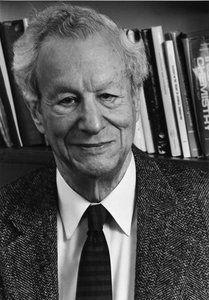Frank H. Westheimer
| Frank Westheimer | |
|---|---|
 |
|
| Born |
January 15, 1912 Baltimore, Maryland, United States |
| Died | April 14, 2007 (aged 95) Cambridge, Massachusetts, United States |
| Fields | Chemistry |
| Institutions |
National Academy of Sciences Harvard University |
| Alma mater | Dartmouth College |
| Notable awards |
Willard Gibbs Award (1970) NAS Award in Chemical Sciences (1980) Arthur C. Cope Award (1982) National Medal of Science (1986) Priestley Medal (1988) |
Frank Henry Westheimer (January 15, 1912 – April 14, 2007) was an American chemist. He was the Morris Loeb Professor of Chemistry Emeritus at Harvard University, and the Westheimer medal is named in his honour.
Born in Baltimore, he graduated from Dartmouth College in 1932 and earned his doctorate in chemistry from Harvard in 1935. He was a member of President Lyndon Johnson's science advisory committee from 1967 to 1970. He also chaired the National Academy of Sciences Committee for the Survey of Chemistry.
Westheimer started his doctoral research with James Bryant Conant. When Conant became president of Harvard, he abandoned research and Westheimer finished his Ph.D. with E.P. Kohler. He continued as a postdoctoral fellow with physical chemist Louis P. Hammett at Columbia University who developed the field of physical organic chemistry, an area that captured Westheimer's interest. His first academic appointment was as a lecturer in chemistry at the University of Chicago. Here he was influenced by attending a course in physics by Kirkwood on electrostatics. He applied these ideas to their effects on the properties of organic compounds. He was also influenced by the development of statistical mechanics by physicists Joseph Mayer and Maria Goeppert-Mayer. He applied the principles of mechanics to the structure of organic molecules, a field that continues as "molecular mechanics" and finds wide application. He also applied this knowledge to the effects of isotopic substitution on the reactivity of organic molecules. His work on the magnitude of kinetic isotope effects is still the basis of understanding in the field.
...
Wikipedia
